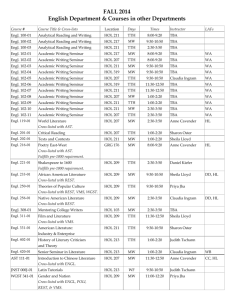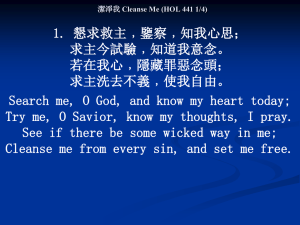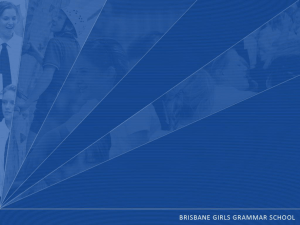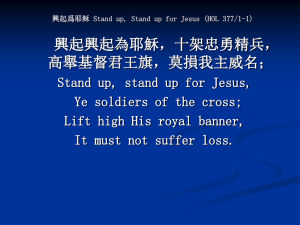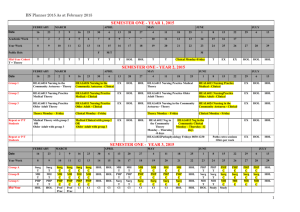Course Descriptions - Spring and May Term 2014
advertisement
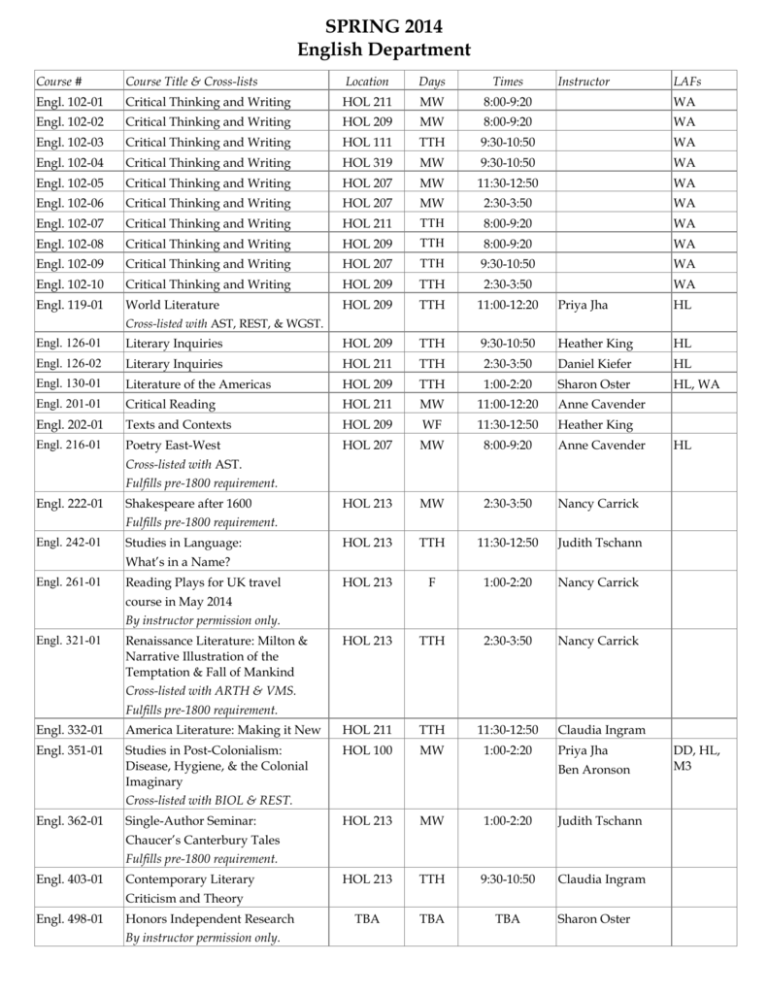
SPRING 2014 English Department Course # Course Title & Cross-lists Location Days Times Instructor LAFs Engl. 102-01 Critical Thinking and Writing HOL 211 MW 8:00-9:20 WA Engl. 102-02 Critical Thinking and Writing HOL 209 MW 8:00-9:20 WA Engl. 102-03 Critical Thinking and Writing HOL 111 TTH 9:30-10:50 WA Engl. 102-04 Critical Thinking and Writing HOL 319 MW 9:30-10:50 WA Engl. 102-05 Critical Thinking and Writing HOL 207 MW 11:30-12:50 WA Engl. 102-06 Critical Thinking and Writing HOL 207 MW 2:30-3:50 WA Engl. 102-07 Critical Thinking and Writing HOL 211 TTH 8:00-9:20 WA Engl. 102-08 Critical Thinking and Writing HOL 209 TTH 8:00-9:20 WA Engl. 102-09 Critical Thinking and Writing HOL 207 TTH 9:30-10:50 WA Engl. 102-10 Critical Thinking and Writing HOL 209 TTH 2:30-3:50 WA Engl. 119-01 World Literature Cross-listed with AST, REST, & WGST. HOL 209 TTH 11:00-12:20 Priya Jha HL Engl. 126-01 Literary Inquiries HOL 209 TTH 9:30-10:50 Heather King HL Engl. 126-02 Literary Inquiries HOL 211 TTH 2:30-3:50 Daniel Kiefer HL Engl. 130-01 Literature of the Americas HOL 209 TTH 1:00-2:20 Sharon Oster HL, WA Engl. 201-01 Critical Reading HOL 211 MW 11:00-12:20 Anne Cavender Engl. 202-01 Texts and Contexts HOL 209 WF 11:30-12:50 Heather King Engl. 216-01 Poetry East-West HOL 207 MW 8:00-9:20 Anne Cavender HOL 213 MW 2:30-3:50 Nancy Carrick HOL 213 TTH 11:30-12:50 Judith Tschann HOL 213 F 1:00-2:20 Nancy Carrick HOL 213 TTH 2:30-3:50 Nancy Carrick Claudia Ingram HL Cross-listed with AST. Fulfills pre-1800 requirement. Engl. 222-01 Shakespeare after 1600 Fulfills pre-1800 requirement. Engl. 242-01 Studies in Language: What’s in a Name? Engl. 261-01 Reading Plays for UK travel course in May 2014 By instructor permission only. Engl. 321-01 Renaissance Literature: Milton & Narrative Illustration of the Temptation & Fall of Mankind Cross-listed with ARTH & VMS. Fulfills pre-1800 requirement. Engl. 332-01 America Literature: Making it New HOL 211 TTH 11:30-12:50 Engl. 351-01 Studies in Post-Colonialism: Disease, Hygiene, & the Colonial Imaginary HOL 100 MW 1:00-2:20 Priya Jha Ben Aronson Cross-listed with BIOL & REST. Engl. 362-01 Single-Author Seminar: HOL 213 MW 1:00-2:20 Judith Tschann HOL 213 TTH 9:30-10:50 Claudia Ingram TBA TBA TBA Chaucer’s Canterbury Tales Fulfills pre-1800 requirement. Engl. 403-01 Contemporary Literary Criticism and Theory Engl. 498-01 Honors Independent Research By instructor permission only. Sharon Oster DD, HL, M3 SPRING 2014 Courses by English Faculty in other Departments Course # Course Title & Cross-lists Location Days Times JNST 000J-01 Henry James HOL 211 TTH 9:30-10:50 Instructor LAFs Sharon Oster Bill McDonald JNST 000O-01 Latin Tutorials JNST 000P-01 “Daoists, Dragons, Dim Sum”: HOL 213 WF 9:30-10:50 Judith Tschann HOL 211 MW 1:00-2:20 Anne Cavender HOL 209 MW 9:30-10:50 Priya Jha W 6:00-8:00 TTH 11:00-12:20 The Traditional Arts of China Cross-listed with AST. VMS 111-01 Introduction to Film Cross-listed with ENGL, REST, & WGST. IDS 365-01 Proudian Sophomore Seminar I HOL 200 Daniel Kiefer MAY TERM 2014 English Department and courses by English faculty in other Departments Course # Course Title and Cross-lists Location Days Times Instructor LAFs Engl. 118-01 Literature of the Bible HOL 209 MTWTH 1:00-3:50 Daniel Kiefer HL Engl. 161-01 Mark Twain and the Gilded Age HOL 211 MTWTH 10:00-12:50 Sharon Oster HL Engl. 161-02 Homer’s Odyssey HOL 213 MTTHF 10:00-12:50 Judith Tschann HL HOL 315 MTTHF 9:30-12:20 Heather King HOL 315 MTWTH 1:00-3:50 Anne Cavender HOL 207 MTWTH 10:00-12:50 Claudia Ingram Fulfills pre-1800 requirement. Engl. 215-01 Children’s Literature Cross-listed with VMS & WGST. Engl. 362-02 Single-Author Seminar William Carlos Williams: Beyond “The Red Wheelbarrow” JNST 000J-01 Sappho’s Legacy REL 226-01 Travel course: Nancy Carrick Religions in Europe Bill Huntley CC SPRING 2014 English Department ENGL 119-01 World Literature Cross-listed with Asian Studies, Race and Ethnic Studies, and Women’s and Gender Studies Priya Jha TTH 11:00-12:20 HL The use of the fantastic, the supernatural, the monstrous, and the spiritual has haunted works of literature. We will discover that often the imaginative mind conjures up characters such as the monstrous mother, the vampire, and the witch, among others in order to redress inequities across lines of gender, sexualities, race, class, and nationalism. What anchors these figures is the way in which they define the concept of the “Other”, which is, to a degree, defined as the part of ourselves we cannot or will not readily face. If you love gothic, fantasy, or horror movies/books, you are already participating in this critique of “what’s real”. The psychoanalyst Sigmund Freud called this feeling the uncanny, which is “undoubtedly related to what is frightening — to what arouses dread and horror” and which is oddly familiar and strange simultaneously. In order to understand why writers, filmmakers, politicians, and other public figures resort to these specific forms and techniques, we will examine various sites of “hauntings” - social, cultural – even political. In doing so, we will span time, space, and cultures. Our primary goal will be reflect upon such hauntings as they seep into our collective unconscious today. Certainly, in the 21st century, the image and the symbolic weight of the “terrorist” defines much of how we construct an American identity which directly defines itself as other than “terrorist.” We will first begin by reading about and theorizing the gothic and its connection to the anxieties of modernity as reflected in Bram Stoker’s famous novel, Dracula. We will then extrapolate key themes from the novel and use them to examine how some of these very fears continue to haunt us well into the 21st century. ENGLISH 126-01 Literary Inquiries Heather King TTH 9:30-10:50 HL This course will cover a range of British and American literature and a range of genres. Over the course of the semester, we will work on developing the analytic skills necessary to have a meaningful conversation about a piece of writing, and then put those skills to practice in both our in-class discussions and in written essays. The central theme that will unify the reading list is the image of the monster. How have authors represented monstrosity? What do the monsters we imagine tell us about our world? Ourselves? Readings may include: Paradise Lost (Milton), Frankenstein (Mary Shelley), and 1984 (George Orwell). ENGLISH 126-02 Literary Inquiries Daniel Kiefer TTH 2:30-3:50 HL Let’s study a whole array of good writing, in fiction, poetry, and drama, starting with Shakespeare’s Macbeth and ending up with contemporary works. The purpose is to increase your enjoyment of literary form by seeing how it’s constructed. We’ll have plenty of discussion in class, and you’ll do various kinds of writing, so as to sharpen your skill in making arguments. And we'll attend a performance of the Shakespeare play as well. More pleasure in reading by reading more deeply—that’s our chief aim. ENGLISH 130-01 Literature of the Americas Sharon Oster TTH 1:00-2:20 HL, WA This introduction to American literature will focus on the “making of Americans.” As we look back from the Colonial era to the present, we will investigate how conflicts of religion, race, gender, class, and sexuality have been central to, if sometimes elided, in the invention and reinvention of “Americans,” and how literature opens up space for contests of power. We will focus on narratives of the exceptional and the idiosyncratic in the face of a conformist social world. We will examine liminal experiences of murder, magic, and madness that form a paradoxically central thread in American literature, and explore themes such as the meaning of the self; the rights of the individual vs. the demands of the group; race, gender, and the law; the meaning of tolerance in American culture; and the struggle for and meaning of democracy. Above all, we will think about how literature shapes this ongoing project and our own contributions to it as readers. What social functions do literary genres like autobiography, drama, the essay, the novel, short story, and poetry perform in the invention and reinvention of Americanness? What aesthetic and social values do literary works enact? We will develop our literary critical skills, and improve our capacities as readers, thinkers, and writers. By analyzing interpretive elements like context, audience, figurative language, and narrative structure, we will explore how literature acts in and on culture and society—not merely reflecting, but shaping and informing how Americans live. This course is also writing-intensive, and will therefore require you to develop a regular writing practice. It will involve every stage of writing including brainstorming, posing provocative questions, literary analysis, addressing different audiences, developing interpretive arguments, challenging those arguments, drafting, and revision, revision, revision. We will discuss assigned literature each class period, and engage in writing mini-lessons throughout the term. ENGLISH 201-01 Critical Reading Anne Cavender MW 11:00-12:20 This course is designed to train students for the English Literature major/minor, or Creative Writing and Johnston students with an interest in textual analysis. After a week investigating the roots of the English language, we will practice the close, critical reading of literary texts (lots of lyric poetry, an epic, a novel), paying attention to the characteristics and effects of literary language, varieties of form, structure, style and genre. We will share our responses and analyses with each other in a variety of ways: curious, complex discussions and precise, persuasive writing. Part of the path to becoming a literary critic is to read other critics in order to evaluate and contextualize different approaches to specific texts. We will practice this skill by reading a few critics throughout the semester. Prerequisite: one 100-level literature class or comparable first-year seminar or by permission. ENGLISH 202-01 Texts and Contexts Heather King WF 11:30-12:50 This course is designed to build upon the close-reading skills you developed in English 201, further preparing you for upper-level work in literary studies. We’ll continue the close reading practices with which you’re familiar, and we’ll move into other kinds of reading, like historical criticism, feminist criticism, post-colonial criticism, and other schools of reading to increase the number of lenses with which you can approach a text. You will also complete a research paper, so that you become familiar with the standard research methods and sources in our field. The tentative reading list includes Shakespeare’s Macbeth, Paradise Lost (Milton), eighteenth and nineteenth responses to that epic, include Joseph Addison’s and William Blake’s, along with Mary Shelley’s Frankenstein, and Neil Gaiman’s Sandman (vol. 4). Prerequisite: Engl. 201. ENGLISH 216-01 Lyric Poetry East-West Cross-listed with Asian Studies Fulfills pre-1800 requirement Anne Cavender MW 8:00-9:20 HL This course will explore the nature of the lyric poem as it appears in the Chinese and Anglo-American contexts. Most of our energies will be engaged in the attentive reading of poems from all periods, ancient to modern, as we attempt to come to some conclusions about the basic similarities and differences between these two extensive poetic traditions. The course will also introduce certain key examples of poetic theory in order to consider more generally the long history of theoretical disputes about what poetry is or does in both traditions. No previous knowledge of Chinese language or literature is required. ENGLISH 222-01 Shakespeare after 1600 Fulfills pre-1800 requirement Nancy Carrick MW 2:30-3:50 English 222 explores Shakespeare’s plays written after 1600, the world they present, Shakespeare's language and theatre. We will confront the dilemmas and ethical questions posed in the plays and, through informal writing and research, an exam, and performances, gain greater appreciation for Shakespeare's art. ENGLISH 242-01 Studies in Language: What’s In a Name? Judith Tschann TTH 11:30-12:50 In our broad-ranging investigation of what’s in a name, we will begin by studying aspects of phonology, morphology, syntax, and pragmatics, e.g., categorizing the particular sounds that members of the seminar use in speaking English, and describing rules and conventions we follow in forming words and sentences and in conversing. For the fun of it, we’ll diagram sentences in old and new ways. To emphasize change in language, we will turn to the history of English, introducing ourselves to Old English and Middle English, and considering especially the nature of metaphor in a few literary works (perhaps in Beowulf, “The Pardoner’s Tale,” and Romeo and Juliet). Throughout the semester, we will also consider sociolinguistic issues, especially concerning multilingualism. Prerequisite: sophomore standing or by permission. ENGLISH 261-01 Reading Plays for UK travel Nancy Carrick F 1:00-2:20 This one-unit course is designed for students traveling to the UK during May Term 2014. We will read the plays that we will see at the Globe and the National Theatre, discuss them, write responses to them, and perform some passages, all in preparation for May. Prerequisite: Instructor permission only. ENGLISH 321-01 Renaissance Literature: Milton and Narrative Illustration of the Temptation and Fall of Mankind Cross-listed with Art History and Visual and Media Studies Fulfills pre-1800 requirement Nancy Carrick TTH 2:30-3:50 Beginning with a few sonnets and the closet drama Samson Agonistes, English 321 will focus on Paradise Lost, the Christian epic that tells the story of a great war in heaven and the fall of angels, their debate about what to do next, the temptation of Adam and Eve by the fallen angel Lucifer/Satan, Adam and Eve’s expulsion from the Garden of Eden and its consequences. In addition, we will explore narrative illustrations of the temptation and fall as they appear in mosaics, book illumination, and stained glass from the 6th through the 16th centuries. Milton’s purpose is ambitious – to “justify the ways of God to men” – and along the way he addresses marriage, politics, the monarchy, fate, predestination, free will, good and evil, and the paradoxes of our human existence. We will read, discuss, debate, and write. Prerequisite: Engl. 202 or by permission. ENGLISH 332-01 American Literature: Making It New Claudia Ingram TTH 11:30-12:50 Literary movements and experiments proliferated in the twentieth-century United States, and some hitherto neglected literatures attained wider audiences. All of this produced wildly various novels and poetry, some of which will teach us new ways of reading. Prerequisite: English 202 or by permission. ENGL 351-01 Studies in Postcolonialism: Disease, Hygiene, and the Colonial Imaginary Cross-listed with Biology and Race and Ethnic Studies Priya Jha and Ben Aronson, Biology MW 1:00-2:20 DD, HL, M3 From the “first contact” to the contemporary period, images of disease, filth, and cleanliness have been used as metaphors in literature and other cultural forms to justify colonialism on the part of the colonizers and to reinforce the barriers between the Subject and the Other. In reality, however, heretofore unknown diseases were also introduced upon the native populations. Further, images of the “dirtiness” of the natives went hand-in-hand with the images of the colonies as diseased. These images, it can be argued, continue to haunt our understanding of other cultures and inform contemporary concerns over biological warfare and the (newer) proliferation of AIDS in the third world, for example. At the same time, a feminist analysis demonstrates that the metaphor of disease applied to gendered subjects in Empire came to bear negatively not only upon women, but upon the colonies themselves, insofar as the colonies were themselves gendered as “feminine.” This course explores these themes in various forms of medical, bio-political, literary and popular cultures – literature, film, social medicine history, medicine and policy, historical documents, and material culture to name but a few. We will cluster around three, perhaps four issues relating to medicine, public health, and empire. We will be attentive to how particular diseases or notions of cleanliness took particular forms during colonial contact – through implementation of particular state policies and treatment of colonial subjects. Prerequisite: one previous literature course required or by permission. Engl. 251 recommended. ENGLISH 362-01 Single-Author Seminar: Chaucer’s Canterbury Tales Fulfills pre-1800 requirement Judith Tschann MW 1:00-2:20 Besides the pleasure of encountering Middle English grammar as we read Canterbury Tales, we will study Chaucer’s poetics and his particular vitality as a storyteller. The many kinds of tales, including bawdy fabliau, romance, Arthurian legend, and beast epic, invite us to read in many different ways, so we will discuss allegorical, mythical, feminist, psychoanalytical, New Historical and other approaches. We will also use the different pilgrims (knight, prioress, monk, lawyer, physician, pardoner, weaver, merchant, etc.) as a basis for studying aspects of late fourteenth-century English social structures, including vocations, gender roles, clothes, and food. ENGLISH 403-01 Contemporary Literary Criticism and Theory Claudia Ingram TTH 9:30-10:50 What are the effects on literature and literary study of an increasingly global, technologically mediated culture? What kinds of powers and pleasures operate in and through literature, and how does it work on us? The twentieth and twenty-first centuries have seen an explosion of theories that address these and related questions. We will read some of them and consider works of literature and other cultural artifacts in light of their formulations. Prerequisite: junior standing or by permission. SPRING 2014 Courses by Literature Faculty in other departments JOHNSTON SEMINAR, JNST 000J-01 Henry James Sharon Oster and Bill McDonald TTH 9:30-10:50 For a full six years Sharon Oster and Bill McDonald have been hoping to host an advanced seminar in the writing of American novelist Henry James (1843-1916). And in the spring of 2014 the time has finally come! Now we’re hoping for a group of readers who will fall under James’s spell as we have, and who are eager to join us in reading his fictions as closely and empathetically as we can. James self-consciously set out to be a writer in his twenties, using the discipline of reviews and criticism, and several long sojourns in Europe, to hone his craft and broaden his experience. He published his first novel in 1875. Book after great book followed—we can’t read them all, alas—and the inexhaustible subtleties of human consciousness, perception and social gesture drew him ever further into the intricacies of language and style. Thematically, loyalty and betrayal, human freedom and the ethical, seeing people as ends or means, are among the subjects that run deepest in his work. Stylistically, he is a realist evolving toward modernism, and a figure whom every succeeding serious novelist and literary critic must take into account. He’s also a brilliant reader of the novel’s history. We’re proposing two “anchor” novels for the course: first, The Portrait of a Lady, then his last complete novel, The Golden Bowl. After pre-registration we’ll meet to choose the rest: Washington Square?? The Bostonians? The Turn of the Screw? What Maisie Knew? “The Beast in the Jungle”? “The Jolly Corner”? “Daisy Miller”? “The Real Thing”? Help us choose! We’re also proposing a few (maybe 4?) Friday afternoon voluntary gatherings, organized by Bill, to watch some remarkable movie/TV productions of James’ work: Jane Campion’s controversial film of The Portrait of a Lady, and the 1973 BBC series recreating The Golden Bowl. Benjamin Britten’s mesmerizing opera The Turn of the Screw is another of several other possibilities. JOHNSTON SEMINAR, JNST 000O-01 Latin Tutorials Judith Tschann WF 9:30-10:50 For some of you, this Latin tutorial will be the second-semester continuation of intensive beginning college Latin. We will quickly review some aspects of grammar from the first semester, and then plow ahead in Wheelock to the glorious end, covering such fine points of grammar as the various forms and uses of the subjunctive, deponent verbs, gerunds and gerundives, “fear” clauses, sequence of tenses, and much more. We will emphasize the practice and theory of translation as we move beyond exercises to real (albeit highly edited) passages of literature and history. For others, this tutorial will be an intensive beginning Latin class, requiring daily homework, memorizing, possible quizzes, a collaboratively designed midterm demonstration of learning, and an ambitious final project. By the end of the semester, you will have a firm grasp of basic grammar (of Latin and of English), a developing sense of the joys and challenges of translating, a bigger vocabulary, and at least a budding interest in Roman literature and history. Everyone is welcome. JOHNSTON SEMINAR, JNST OOOP-01 “Daoists, Dragons and Dim Sum”: The Traditional Arts of China Cross-listed with Asian Studies Anne Cavender MW 1:00-2:20 This course will be an interdisciplinary exploration of the cosmology, philosophy, language, literature and cultural arts of ancient China. After a short introduction to the classical Chinese language, we will negotiate which direction to go in next, which depending on the personnel could include feng-shui and divination practices from the I-ching, mythology, philosophy, poetry, garden design, politics and statecraft (The Art of War), martial arts novels, or wherever our curiosities lead us. If theory-heads enroll, we can end the course by probing the long-standing U.S. fascination with the Chinese language (here’s looking at you, Ezra Pound and Joss Whedon), but with three thousand years to cover, that might have to wait for a future semester. VISUAL AND MEDIA STUDIES 111-01 Introduction to Film Cross-listed with English, Race and Ethnic Studies, and Women’s and Gender Studies Priya Jha MW 9:30-10:50 Film Screening Lab W 6:00-8:00 In this class, we will discover together the multifaceted world of cinema. It will introduce you to the pleasures of cinema, both as spectator and as critic. You will get an overview of the main theoretical frameworks, critical concepts, as well as developing and using film vocabulary in class discussions and in written assignments. We will think about movies critically, as technological, cultural and artistic products. MAY TERM 2014 English Department and Courses by English Faculty in other departments ENGLISH 118-01 Literature of the Bible Daniel Kiefer MTWTH 1:00-3:50 HL And the Lord said unto Moses, Come up to me into the mount, and be there: and I will give thee tables of stone, and a law, and commandments which I have written: that thou mayest teach them. —Exodus 24:12. But Jesus stooped down, and with his finger wrote on the ground, as though he heard them not. —John 8:6. The Hebrew and Christian Bibles abound with all kinds of written forms: story, allegory, history, proverb, law, poetry, prophecy, psalm, parable, epistle, apocalypse, and more. Let’s explore the literary power of these genres as the basis of scripture. We’ll take up questions of revelation, translation and canonicity; inspiration and faith; rhetoric and tradition; allusion and originality; always from the standpoint of literature. We’ll have plenty of reading every night, and not just the King James Bible, but literary interpretations of its various books as well. Then we’ll have plenty of discussion together every day and substantial critical writing every week. Please come prepared for new ways of understanding the written constructions of these many, marvelous books. ENGLISH 161-01 Mark Twain and the Gilded Age Sharon Oster MTWTH 10:00-12:50 HL Humorist, novelist, lecturer, philosopher, satirist and social critic: these all describe Mark Twain (or rather, Samuel Clemens), one of the most iconic and controversial writers in the United States. The fundamental focus of this seminar will be to look at Twain as a satirist, one whose life and work raise more questions than provide answers. How does Twain’s satire work? Who and what are his targets? How are irony, the doubling of characters, and literary imposture effective literary techniques? Entrenched racism, religious hypocrisy, corporate scandal, political corruption, economic crisis: these are some of the social and political phenomena that led Twain to dub the late-19th century the “Gilded Age,” an “era of incredible rottenness.” Are we living in a “second Gilded Age”? What can Twain tell us about his era, but also our own? Is Twain a relevant social critic for readers in 2014? Prepare to immerse yourself in the work of one of the smartest, wittiest, and most politically and socially satirical writers of the last two centuries! We will read about two dozen of Twain's short stories spanning his nearly forty-year career, and three novels including The Adventures of Huckleberry Finn. Students will be asked to set up blogs in groups in which to contribute weekly posts about the reading, to post a “quote of the day” for each day of class, and to write a final paper that expands upon one of their best blog postings. Students will be evaluated on these assignments as well as weekly quizzes, and contributions to class discussions. ENGLISH 161-02 Homer’s Odyssey Fulfills pre-1800 requirement Judith Tschann MTTHF 10:00-12:50 HL Ten years after the end of the Trojan War, the hero Odysseus has still not returned home to Ithaka. His son, Telemachus, decides he must search for his father, and his wife Penelope keeps up her hopes and her weaving tricks, holding off the suitors who pester her endlessly. What has detained Odysseus, and how does he finally get home? If you haven’t read Homer’s epic poem, you have a great treat ahead: wily Odysseus’ adventures, romances, and temptations, the goddess Athena’s intervention in human affairs, Telemachus’s coming of age, Penelope’s strength, and a family reunion full of ruthless vengeance as well as tender love. If you have read this epic, you will have the joy of rediscovering its beauty, freshness, relevance, moral force, and humor. ENGLISH 215-01 Children's Literature Cross-listed with Visual and Media Studies and Women’s and Gender Studies Heather King MTTHF 9:30-12:20 The stories we tell children serve a variety of purposes - from explaining away childhood fears to inculcating values we would like to see replicated - and a closer look at many children's stories reveals both surprisingly adult themes and interesting messages about how a culture defines childhood. This course will focus on the fairy tale tradition, with an emphasis on how those stories are then translated into modernized versions, including film and television productions. Our reading will take a wide historical sweep, from the early folk tales to the literary tales of Perrault, Basile, Grimm, and others (Cinderella, Little Red Riding Hood, Beauty and the Beast) to the later offerings of Wilde and Andersen (The Snow Queen, The Little Mermaid), and the modern twists available in pictures books (Dinorella?) and young adult fiction (A Tale Dark and Grimm). In addition, because we’re looking at a story tradition that moves from oral to written, it seems especially appropriate to be mindful of our equivalent to oral traditions: film and TV. We’ll consider the influence of Disney, the counter tradition of Studio Ghibli, and live-action offerings like Brothers Grimm, Mirror, Mirror, or television’s Once Upon a Time. Our reading will be supplemented by secondary articles that will help provide additional insight into how children’s literature communicates a complex range of ideological content. The syllabus for this course is not yet carved in stone, so interested students with ideas should contact me as soon as possible. There will be a LOT of reading for this class, since we will need to move through texts rather quickly to cover ground over the month; be prepared for that. Active discussion and frequent writing assignments will provide avenues for you to explore your ideas in more depth. Please also plan to be available for evening film screenings once to twice a week. Prerequisite: sophomore standing; one literature course recommended or by permission. ENGLISH 362-02 Single Author Seminar William Carlos Williams: Beyond “The Red Wheelbarrow" Anne Cavender MTWTH 1:00-3:50 This course will focus on the poetry and prose of William Carlos Williams. We will start with his autobiography, and then move on to close readings of his ground-breaking experimental works "Kora in Hell” and "Spring and All” and a wide swath of his lyric poetry, culminating with of his epic hybrid prose-poem Paterson. Because Williams refers so widely in his work to other writers (H.D., Pound, Stevens, Joyce, Stein) and visual artists (Cezanne, Brancusi, Duchamp, Charles Demuth, Marsden Hartley), you’ll come out of this course having learned a great deal about early 20th century modernism generally. JOHNSTON SEMINAR, JNST 000J-01 Sappho’s Legacy Claudia Ingram MTWTH 10:00-12:50 We don’t know much about Sappho beyond the fragmentary remains of her poetry, but she may nevertheless be thought to have several legacies. She is the first known European woman poet, producing lyrics in the sixth century BCE. Judging by their fragmentary remains, many of her lyrics were love poems directed toward other women. Although nearly all of her work was destroyed over the centuries, the fragments that remain suggest a compelling style. Two twentieth-century poets—Olga Broumas and T Begley—maintain that Sappho’s work embodies a poetics of praise. Others have engaged it as a way of thinking about fragmentary expression and how it may be read. Writers have read and reread her work for all of these reasons. Since this is offered as a Johnston seminar, I’d like to know what strands of Sappho’s legacy you might be interested in pursuing. I’d like us to read later poetry and / or novels—and I’d like to hear from you. Come see me! RELIGIOUS STUDIES 226-01 Travel Course: Religions in Europe Nancy Carrick and Bill Huntley Join us on a May Term tour of London and Oxford, southern Scotland and the island of Iona, the west coast of Ireland and Dublin. CC BIOGRAPHIES NANCY CARRICK Nancy teaches Shakespeare, Milton, and drama in its many guises. She is especially interested in the interdisciplinary study of dramatic images on stage and in book illustration, in classical texts and vase painting, and in the interaction of text and performance. ANNE CAVENDER Anne Cavender studies and teaches classical Chinese poetry, British and American modernism, and cross-cultural poetics, particularly the relationship between literature and ethics in the Chinese and Western traditions. Many of her classes will be cross-listed with Asian Studies and can be taken for credit under either major. CLAUDIA INGRAM Years ago I was a lawyer, and I’m still interested in that discourse. Now I’m drawn to the ways poems and novels complicate things. PRIYA JHA I am a nomad in many senses of the word, from being someone who has traveled many parts of the world to someone whose intellectual training has traversed just as many critical and linguistic spaces. A friend once described me as “a delectable mélange of East Indian, New York, and valley girl dialects” and, to a large extent that reflects who I am – someone who straddles and (hopefully) challenges many cultural and national boundaries. Because I feel more comfortable belonging in a world that extends beyond India (my place of birth) or the United States (where I have spent most of my life), I have found myself continuously drawn to writers and critics who examine various aspects of cross-cultural identities, historically, culturally, and politically and their various negotiations. In any of my classes, whether it be World Literature, Post-colonial literatures, Film, or Cultural Studies, students find themselves encountering these issues in our analyses of a multitude of cultural and literary forms. DANIEL KIEFER It took only a few years for Redlands to change my dreary existence to a life of glamour. I used to be so drab, teaching only the household poets of the nineteenth century. Now I go dancing under the stars with disreputable poets and theorists of every kind. After decades of earnest propriety--seminary high school in Cincinnati, college in Boston, graduate work at Yale, teaching in the coal fields of Southern Illinois--I have become dissolute in Tinseltown. If Johnston is the cause of my ruin, that's all right; somebody had to take over. HEATHER KING Born in Claremont, CA, I come back to the area by way of Boston University (BA) and the University of Wisconsin (Ph.D.). My research on 18th century British women writers and has convinced me that discussions of literature should always be both rigorous and a bit irreverent. My particular interests center on women’s writing and questions of morality, but don’t let that mislead you -- whatever the genre, whatever the time period, I'm determined to find the meaning and the merriment in the text. SHARON OSTER My scholarship focuses on late-nineteenth and twentieth-century American literature, with particular interests in literary realism and the novel, Jewish literature, and literature of the Holocaust (Nazi genocide). While my current book project is about how time, particularly sacred time, figures in American literary realism, I have recently become interested in literary figurations of space and geography, and metaphorical mapping. In my classes, we explore the complexities and pleasures of literary aesthetics—of literature as art— sometimes for its own sake, other times for the sake self-expression, social critique or ethical injunction (and often several of these combined). I teach a range of courses in nineteenthand twentieth-century American literature featuring authors such as Henry James, Edith Wharton and Mark Twain; in immigrant and ethnic literatures; in studies of the novel; graphic novels; the 1960s; and literary and oral accounts of the Holocaust. On one side, I teach works that explore experiences of oppression, suffering, extreme violence, resistance, and mortality; on the other, I teach satire and parody, if only to retain a sense of balance and humor. JUDITH TSCHANN Judy Tschann teaches a variety of courses in literature and language, including Chaucer, Shakespeare, History of English Linguistics, and History of Literary Criticism. She’s working up a course on Laughter. Send suggestions (or a good joke).
